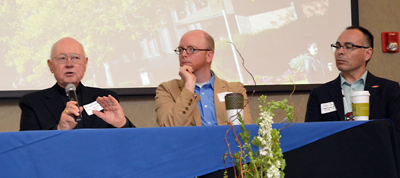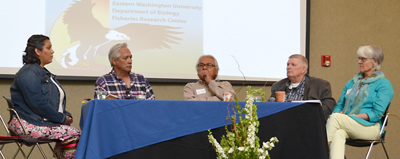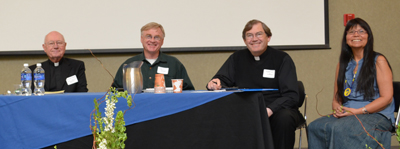Leaders document damage by dams to Columbia River
As U.S. and Canadian leaders prepare to renegotiate the Columbia River Treaty, Gonzaga University hosted a conference in May for religious, tribal and community leaders to document damage from dam-building to stream flows, cultural traditions, fish habitat and indigenous people.
 |
Bishop Emeritus William Skylstad, Brian Henning and John Sirois share on “The Rivers of Our Moment: Ethics and Water.” |
Many of the 100 participants endorsed an eight-point declaration that calls for “modernizing” the treaty to advance stewardship in managing the river system beyond the limited goals of flood control and power production.
Rights and authorities of U.S. Tribes and Canadian First Nations were not consulted in negotiations for the treaty ratified in 1964.
Indigenous people had depended on the return of salmon and other fish for half of their food.
The treaty will change in 2024. If one country wants changes, it needs to give 10 years notice—by September 2014. The State Department will announce the U.S. negotiating position later in 2014, said John Osborn, a conference organizer from the Upper Columbia River Group of the Sierra Club.
 |
Stevey and Virgil Seymour, Ruben Henry, Allan Scholz and Eileen Delehanty Pearkes discuss “The Rivers through Our Memory.” |
Speakers and participants at the conference on “Ethics and the Columbia River Treaty: Righting Historic Wrongs” committed to promote dialogue on ethics-based reforms to the treaty.
The Declaration on Ethics and Modernizing the Columbia River Treaty recognizes the 1993 pastoral letter by the region’s Roman Catholic bishops, “The Columbia River Watershed: Caring for Creation and the Common Good,” as a template for decision-makers in both nations to consider moral dimensions as they renegotiate the Columbia River Treaty (CRT).
Presentations followed the pastoral letter’s format: 1) “The Rivers of our Moment: Ethics and Water,” 2) “The Rivers through our Memory,” 3) “The Rivers of Our Vision: The Treaty,” and 4) “The Rivers as our Responsibility: Stewardship, Justice in Action.”
The declaration, drafted prior to the event by planners—consulting with Steve Kolmes of the University of Portland who helped draft the pastoral letter—sets eight principles for a new treaty:
• Respect the rights, dignity and traditions of indigenous people by including them;
• Include healthy ecosystem function;
• Achieve balance among river uses for power production, flood management, and healthy waters and flows for abundant, sustainable native fish and wildlife;
• Develop water management
to help people, species and ecosystems withstand climate change;
• Provide ecosystem management while protecting other river uses, including tribal, commercial, ceremonial and subsistence activities;
• Engage local communities in a meaningful, transparent, inclusive way in the renegotiation and future management of the treaty;
• Address economic and environmental justice for the poor, and economic development, and
• Restore anadromous and resident fish passage to historical locations throughout the Columbia River basin.
John said federal agencies recommend both countries develop a framework for the treaty that ensures “a resilient, healthy ecosystem-based function throughout the basin, while maintaining an acceptable level of flood risk and assuring reliable and economic hydropower benefits. The four Northwest states, 15 Columbia Basin tribes, fishermen and environmentalists support that recommendation.”
In March, British Columbia released a draft recommendation that the treaty be renewed and changes occur in the existing framework. It holds that ecosystem values are, and should continue to be, a consideration along with adapting to climate change, John said. The federal government in Ottawa has not yet announced Canada’s position.
Bishop William Skylstad said the Catholic pastoral letter was not an abstraction for him. He grew up in Methow on a tributary of the Columbia River and he knows the river well. Many listening sessions went into developing the letter to frame ethical decision making.
“We saw the contradiction between human behavior and pollution of the beautiful countryside,” he said.
The letter speaks of the sacred responsibility to be caretakers of the watershed for the common good, to conserve the watershed and wildlife, to respect the dignity of indigenous people, to promote justice for the poor, to balance economy and ecology.
“There is awe in seeing salmon come back to the same gravel bars where they hatched four years earlier,” he said. “Talk of a miracle today. It’s incredible, a wonder of wonders.”
John Sirois, a tribal leader and member of the Okanogan and Wenatchi Bands in the Colville Confederated Tribes from Omak, said the indigenous worldview has always related with the river. While he has a bachelor’s degree in history from Dartmouth and a master’s in public administration from the University of Washington, he still values stories his mother, grandmother and aunts told him about Wenatchi ways, root baskets, river transportation, fish camps and water in creation stories.
“The river gives us our four foods, salmon (with omega 3s), berries, roots and deer,” he said. “Tribes have taken care of the river and watershed, because it feeds us. We are to leave it better. When we give to the river, it gives back to us.
“Grand Coulee Dam protected what is down river from floods by flooding our homes. We avoided floods by moving up the hillsides. We understood the river could be plentiful and could be dangerous.
He remembers the pain of people who told of digging up ancestors’ bones to move them and their towns when the dams flooded their territory.
“We need to keep telling the stories and singing the songs of connecting to the river and watershed. We are caretakers for future generations,” John said, concerned for children who have lost connection with the past but hopeful because of the 20 years of efforts to restore habitat at a salmon hatchery below Chief Joseph Dam.
Brian Henning, professor of philosophy and environmental studies at Gonzaga University, spoke of the tendency “to see ethics minimalistically: that anything legal is moral.” He calls for a broader view of ethics that includes “what a good life is and how we ought to live” based on intrinsic value and meaning.
He said stewardship is a moral step beyond mere sustainability, because it “challenges the notion of ownership and privilege,” and sees the environment as “given to us to care for and use responsibly for future generations.”
Citing conservationist Aldo Leopold, he suggested that the “key-log” to “release the evolutionary process for an ethic is simply this: quit thinking about decent land (water) use as solely as an economic issue. Examine each question in terms of what is ethically and aesthetically right, as well as what is economically expedient. A thing is right when it preserves the integrity, stability and beauty of the biotic community. It is wrong when it tends otherwise.”
Allan Scholz, biology professor at Eastern Washington University, used historic logs of missionaries, explorers, traders and early settlers on the abundance of salmon to establish the loss. He estimated that indigenous people consumed 41,754,800 pounds of salmon a year—50 percent of their diet.
He also shared descriptions of the Columbia, with its rapids and falls, as a “river of rainbows” formed as light refracted through perpetual mist and spray.
 |
Bishop William Skylstad, Pat Ford, Bishop Martin Wells and Pauline Terbasket shared about “The Rivers as Our Responsibility: Stewardship, Justice in Action.” |
Eileen Delehanty Pearkes, a U.S. writer and researcher living near Nelson, B.C., is recording cultural and ecosystem impacts above the border. While 15 percent of the Columbia Basin landmass is in Canada, it supplies 40 percent or more of the water through runoff of mountain snow.
She said the 1948 flood of Vanport, Ore., has been widely used to create urgency about protecting urban areas, but the city was mostly temporary housing for migrant workers built on a floodplain.
About 2,300 Sinixt of the Arrow Lakes Band were displaced without compensation as the Hugh Keenleyside Dam, authorized by the treaty, flooded their traditional territory and sacred sites. There was no consideration of ecological principles, aquatics, wetlands or territorial losses in Canada, Eileen said.
“Positive effects were felt outside the region, but negative effects were and are experienced in the region, including barren reservoir banks during annual draw downs behind the dams,” Eileen said.
As Sinixt, Virgil Seymour and his daughter Stevey Seymour, are members of the Colville Confederated Tribes. They told of people being pushed out of their traditional territory—from Kettle Falls to Revelstoke along the Columbia, then at Kelly Hill, then at Lower Inchelium.
Ninety-five percent of 120 archaeological sites—from 150- to 3,100-year-old winter villages of pit houses—are under water or destroyed, said Stevey.
“By 1872, when many Sinixt were moved to the Colville Reservation, we had lost much of our language—our oral bible—and our songs,” she said.
Teck Cominco Smelter came 100 years ago and dumped toxic sludge into the river, making the salmon unsafe to eat, said Stevey.
The Colville Confederated Tribes, Spokane Tribe and the State of Washington joined in a lawsuit and held Teck Cominco liable and responsible to clean up the contamination.
Even though the Canadian government declared the Sinixt extinct in Canada in 1956, Virgil said, “We are still here, living by the river. We are reconnecting with our past and speaking for ourselves.”
Believing education is important to help people in Sinixt homelands learn about, connect with and understand the people who once lived there, he visits schools, museums and organizations in traditional Sinixt areas to promote awareness of first foods, sacred places, fish passage and sludge cleanup.
While few eat fish now, Virgil is hopeful, because the Salish School in Spokane teaches children and adults to speak Salish, and the Language House in Inchelium records elders’ stories.
Ruben Henry of Warm Springs, Ore., expressed concern about broken promises, coal and oil trains, and algae choking out salmon.
Jennifer Ferguson, who grew up on a cattle ranch on the Colville reservation near Inchelium following Catholic traditions, did not know her Indian traditions. She began to rediscover her heritage,when she was asked to do an honor dance at powwows when her daughter was Miss Colville.
In the 1980s, she visited a Sinixt elder in the Slocan Valley, B.C., to find her roots. To learn more, she studied at the Institute of American Indian Arts in Santa Fe, N.M., then worked three years with the Native American collection at the Northwest Museum of Arts and Culture in Spokane, and five years with the National Park Service at Fort Spokane, before becoming coordinator of the historical and archaeological program at the Colville Tribal Museum in Coulee Dam.
Four years ago, she became ill after doing digs near Evans and Barstow, auguring down 30 feet through black sludge to the original ground.
She has helped prepare educational DVDs on legends, coyote stories, the fishing legacy, the impact of Grand Coulee Dam on tribes and tribal history stories of two elder women.
Rachael Paschal Osborn of the Columbia Institute for Water Policy spoke on the impact of climate change and the Public Trust Doctrine.
She showed slides of the marked decline in the Columbia Glacier between 1980 and 2005, reducing water flowing into the system and changing the timing of stream flows.
“Property rights to water do not include destroying the ecology,” she said. “The Public Trust Doctrine with roots in Justinian laws of 533 is gaining traction as a tool for addressing climate change.”
The ecological changes, she said, will have economic consequences.
D.R. Michel, executive director of the Upper Columbia United Tribes (UCUT) and member of the Confederated Tribes of the Colville Reservation, calls for ecosystem functions to be co-equal with flood prevention and energy production.
“These are not just tribal issues, because ecosystem functions benefit all of us,” he said.
He believes the goals are politically achievable given the will of people to hold politicians accountable and the availability of inexpensive, new technologies—suction tubes to “whoosh” fish up over dams, trucks to carry fish around dams and fish hatcheries releasing fish into tributaries—making fish passage possible.
Randy Friedlander, fish and wildlife director of the Colville Tribe, is hopeful that in the future U.S. and Canadian tribes can work on fish passage. He once thought it was impossible to get salmon over Grand Coulee Dam, but redband trout released above the dam are below Bonneville, and Pacific lampray eel have been seen on rocks at Kettle Falls.
Action at each dam will inspire fish passage at the next. Arrow Lakes will install fish passage if there is fish passage at Grand Coulee and Chief Joseph. Brilliant Dam expansion includes diversion of juvenile fish from the powerhouse. Waneta’s expansion includes fish passage.
“We have come far,” said Randy, aware his grandfather had been beaten for speaking his language and now people speak it openly. “Yes, we can get passage.”
Bishop Martin Wells of the Eastern Washington Idaho Synod of the Evangelical Lutheran Church of America said that as he visits congregations he will promote a theology that fosters respect for creation and values of the Catholic pastoral letter, and awareness of the common good and the public trust doctrine as part of the sacred trust of God.
“Public trust is fundamental to human life and inconsistent with private control,” he said. “I will be an ambassador to other faiths to embrace the Columbia River Watershed Pastoral Letter, connect with 22 tribes as protectors of water values and apply Lutheran ethics through our synod’s public policy advocacy.
“I feel the weight of radioactive material moving toward the river at Hanford. I’ve imagined myself on top of the Wauluke Slope, starting a prayer vigil of people from all over the world, praying that the radioactive materials not infect the river.”
Pat Ford, who is retired from Save Our Wild Salmon, spent his career since 1992 focused on salmon as “teachers” about human and natural life.
“Almost every one of us has been and is today a beneficiary of the dams, whether in electricity, low power bills or commerce, so we must face and remedy the continuing costs of the dams and treaty to people, waters and lands,” he said. “What is our role for justice and stewardship?”
He calls for people to speak out in political and economic contexts, to acknowledge disruption to native people, to redress past harms in a treaty that better serves the future, and to engage in dialogue and action on climate change.
“We must take responsibility for this long-term task,” Pat said.
Pauline Terbasket, executive director of the Okanogan Nation Alliance, thinks miracles can happen when she looks at what is possible and what can contribute to stewardship.
“Our people previously connected to the land and river for all they needed for life,” she said.
Bishop Skylstad said that in his last decade of ministry “in a church with a pile of hurts,” he found it important to say, “I’m sorry, forgive me.” He urged the dominant culture to ask the native people for forgiveness.
Along with that, he said it’s important to act to bring changes to right the wrongs.
John Osborn told of efforts to have more organizations, tribes, churches and faiths sign the declaration.
Gonzaga University’s new Native American Studies, its Environmental Studies and Political Science Departments hosted the day-long conference in May at Gonzaga. Organizers included the Faith and Environment Network, Upper Columbia United Tribes, the ELCA Lutheran Synod, the Columbia Institute for Water Policy, the Sierra Club, the Center for Environmental Law and Policy, and Save Our Wild Salmon.
For information, call 939-1290 or email john@waterplanet.ws.
A video is available at https://vimeo.com/96632516. The declaration is at waterplanet.ws/pdf/Ethics-Treaty_Declaration.pdf
Copyright ©June 2014 - The Fig Tree




